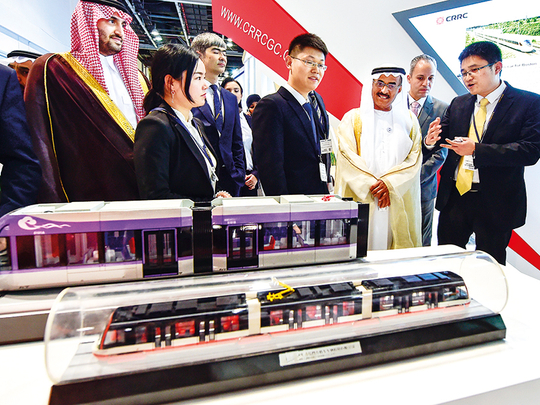
Dubai: Gulf Cooperation Council (GCC) nations remain committed to the Gulf railway project, a top official told delegates at the Middle East Rail conference on Monday.
Khalifa Bin Saeed Al Abri, Assistant Secretary-General for Economic and Development Affairs at the GCC General Secretariat, said that despite the delay in the railway project — originally slated for completion at the end of 2018, but rescheduled last year to the end of 2021 — GCC countries remained to committed its success and to investors.
He noted that the first stage of the UAE’s railway project was 264km that are operational between Shah in Abu Dhabi’s Western Region, and Ruwais, near the border with Saudi Arabia.
Saudi Arabia had designed and was working on 200km of rail track to link with the Gulf Railway, while Qatar, Bahrain and Kuwait were designing their portions.
However, behind the scenes, he noted great progress on international agreements, with 16 technical agreements made to cover the design, building and operational aspects of the railway network.
The first stage of the UAE’s Etihad Rail has transported 16.2 million tonnes of granulated sulphur since it began commercial operations in January 2016, the acting CEO of operators Etihad Rail DB, said in a keynote presentation.
Saeed Al Suwaidi said the full rail system would bring several benefits to the country, including boosting the economy and reducing carbon emissions.
“Rail opens up trade, connectivity, and creates jobs for both UAE nationals and expats,” he said. “It will become a source of industrial diversification.”
He added that the first stage of Etihad Rail had achieved 94 per cent punctuality during its commercial operations, hitting 100 per cent in January 2018. He also hailed its safety record, saying not a single day had been lost to accidents, as well as its impact on road safety.
“Railways always enhance safety,” he said. “It’s a very simple equation. One fully loaded train equals 300 trucks per trip. So one fully loaded train equals less trucks — less trucks on the road means we need less maintenance on the road; less maintenance on the road means less cost.”
He added that transporting freight by rail would reduce carbon emissions by up to 80 per cent compared with road transport. Granulated sulphur, shipped on behalf of Abu Dhabi National Oil Company (Adnoc), forms the bulk of the first stage’s cargo.
In a panel discussion giving an overview of regional rail progress, Mohammad Saud Al Hadbah, a board member of Kuwait’s Public Authority for Roads and Transportation, said his country was working on a 110km length of rail to connect to the GCC network, with an additional 160km of freight line to connect Kuwait City with its port.
“We’ve finished the alignment and corridor for the project. We are now in the process of tendering it to a consultant in order to shortlist a consortium that will bid for the project,” he said.
Egypt to award Red Sea-to-Mediterranean rail tender in H2 2018
Dubai: Egypt plans to award a tender for a high-speed railway between the Red Sea and the Mediterranean in the second half of 2018, transport minister Hesham Arafat said Monday. The project will connect the eastern resort of Ain Al Sokhna to Al Alamein, a town west of Alexandria that was scene of a battle in World War Two.
“We are working currently on the technical evaluation and the financial evaluation of this project,” Arafat told Reuters at a conference in Dubai, adding that the contract was expected to be awarded by July, with construction set to start this year.
More than 10 international companies are currently involved in the tender process, he said, without giving any names.
— Reuters










